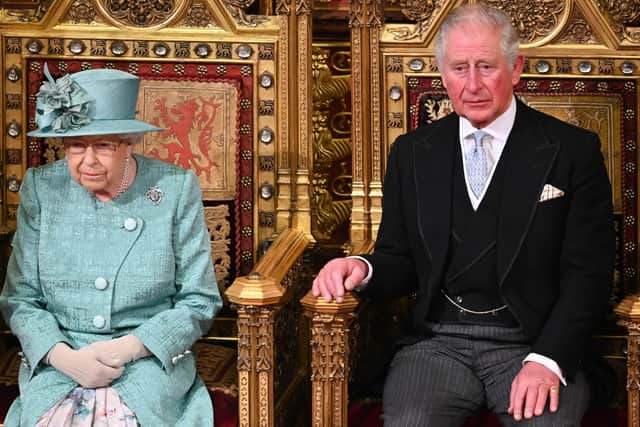House of Lords plays vital role in democracy but needs reform - William Wallace
The United Kingdom does not have a written constitution. The conventions which govern relations between government, civil service, Parliament and the courts have depended on Ministers and Opposition leaders acting “honourably” and within these limits.
Jeremy Corbyn seemed willing to break these conventions. Boris Johnson has broken them, both when he resigned as Foreign Secretary and returned within days to his well-paid column in the Telegraph, and on several occasions as Prime Minister so far. When governments behave unconstitutionally, the Lords and the Supreme Court can hold them back.
Advertisement
Hide AdAdvertisement
Hide AdFormally, the UK has parliamentary sovereignty. But when one party has a secure Parliamentary majority, government proposals usually sail through the Commons.


A former Conservative Lord Chancellor once described British democracy as “elective dictatorship” – when his own party was in government.
The Lords is the chamber that examines Bills and regulations in detail, forces Ministers to justify them clause by clause, and quietly wins concessions before they become law.
I was appointed to the Lords just before Tony Blair’s Labour government removed most of the hereditary peers 23 years ago. That was intended to be the first stage in a process that would lead to a second chamber elected from the nations and regions of the UK. I looked forward to standing for election in the Yorkshire region when that happened.
Advertisement
Hide AdAdvertisement
Hide Ad

But both Labour and Conservative MPs resisted a second elected House. And while the 2010 coalition agreement included a commitment to a largely elected House, Conservative MPs killed the Bill in the Commons.
Last December’s election restored the dominance of government over Parliament. Nearly 100 of the 365 Conservative MPs are in the government. Government patronage provides opportunities for many others, while the hope of future ministerial office keeps others loyal.
Labour has almost as many in its “shadow” team. The third largest party in the Commons is the Scottish Nationalist Party. Its 48 MPs represent four per cent of voters, benefitting from the concentration of their votes under our first past the post system.
Boris Johnson spends little time in Parliament, and clearly hates Prime Minister’s Questions. He expects the House of Commons to provide secure support for whatever the Government decides.
Advertisement
Hide AdAdvertisement
Hide Ad

Are you a democrat or a supporter of strong government? If you are a democrat, you have to support reform of the Commons as well as the Lords, and tackle the weakness of local and regional representation as well.
If you believe in strong government, beware that governments without parliamentary challenge become authoritarian and corrupt, and take note that billions of pounds have been handed out to large consultancies and outsourcing companies this year without open contracts.
The Government is now attempting to rush the Internal Market Bill through Parliament, which permits it to break a treaty that it signed and Parliament ratified less than a year ago, prevents the courts from challenging its actions, takes back powers from the Scottish, Welsh and Northern Ireland governments, and gives Ministers authority to make future decisions on important issues with minimal scrutiny.
It passed quickly through the Commons, with Tory backbenchers whipped to support. On October 20, after a long opening debate, the Lords voted for an amendment moved by a former Chief Justice, warning that detailed examination would involve major changes. Some 395 peers supported the amendment, from all the different groups in the Lords, against 169 for the Government.
Advertisement
Hide AdAdvertisement
Hide AdLords from across the House asserted that the Bill raises questions of constitutional principle, which entitles the second chamber to stand firm.
Yes, the current composition of the Lords is indefensible. Yes, it’s too large; the House had negotiated an understanding that new appointments to each of the groups would be held down to one for every two that resigned or died, but Boris Johnson’s long list of new peers has destroyed that aim.
Yes, while 500-550 peers work hard on committees and Bills, there are others who rarely appear or come in only to pick up their allowance. It desperately needs reform – like much else in the UK’s central and local structures of government.
But if you care about limited, constitutional government, the foundation for any open democracy, the Lords plays an essential role.
Advertisement
Hide AdAdvertisement
Hide AdLord Wallace of Saltaire is a Lib Dem peer. He was a Minister in the 2010-15 coalition.
Support The Yorkshire Post and become a subscriber today. Your subscription will help us to continue to bring quality news to the people of Yorkshire. In return, you’ll see fewer ads on site, get free access to our app and receive exclusive members-only offers. Click here to subscribe.
Comment Guidelines
National World encourages reader discussion on our stories. User feedback, insights and back-and-forth exchanges add a rich layer of context to reporting. Please review our Community Guidelines before commenting.